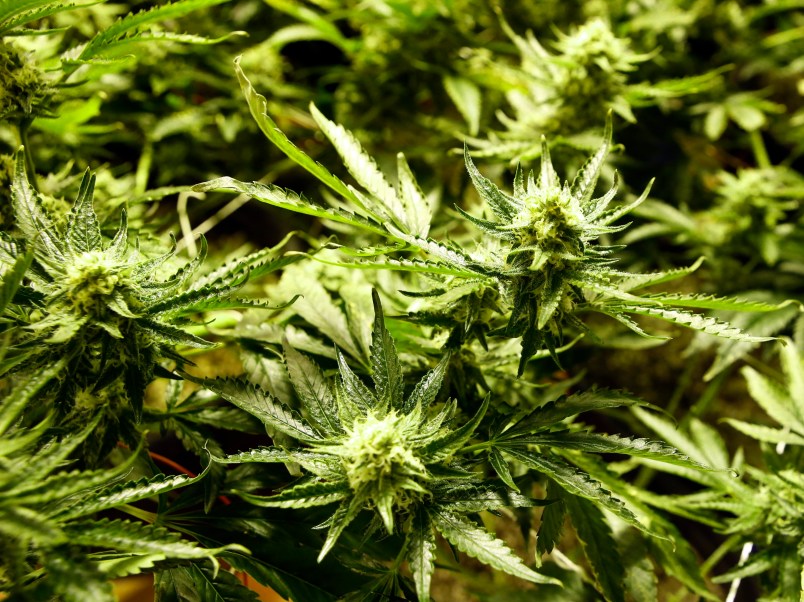DENVER (AP) — Colorado will spend more than $8 million researching marijuana’s medical potential — a new frontier because government-funded marijuana research traditionally focuses on the drug’s negative health effects.
The grants awarded by the Colorado Board of Health will go to studies on whether marijuana helps treat epilepsy, brain tumors, Parkinson’s disease and post-traumatic stress disorder. Some of the studies still need federal approval.
Though the awards are relatively small, researchers say they’re a big step forward. While several other federal studies currently in the works look at marijuana’s health effects, all the Colorado studies are focused on whether marijuana actually helps.
“This is the first time we’ve had government money to look at the efficacy of marijuana, not the harms of marijuana,” said Dr. Suzanne Sisley, a Scottsdale, Arizona, psychiatrist who will help run a study on marijuana for veterans with PTSD. Sisley plans to do her research in private practice after previously working for the University of Arizona.
Federal approval to study marijuana’s medical potential requires permission of the Food and Drug Administration, the Drug Enforcement Administration, and either the National Institutes of Health or the Department of Health and Human Services. And there’s only one legal source of the weed, the Marijuana Research Project at the University of Mississippi.
Twenty-three states and Washington, D.C., allow marijuana use by people with various medical conditions. But under federal law, pot is considered a drug with no medical use and doctors cannot prescribe it.
Dr. Larry Wolk, Colorado’s Chief Medical Officer, says the lack of research on marijuana’s medical value leaves sick people guessing about how pot may help them and what doses to take.
“There’s nowhere else in medicine where we give a patient some seeds and say, ‘Go grow this and process it and then figure out how much you need,'” Wolk said.
“We need research dollars so we can answer more questions.”
Three of the eight research projects, including the veterans study, will still need federal clearance and access to the Ole Miss marijuana. The other five are “observational studies,” meaning the subjects will be providing their own weed.
Among the projects poised for approval Wednesday:
— Two separate studies on using marijuana to treat post-traumatic stress disorder ($3.1 million)
— Whether adolescents and young adults with irritable bowel syndrome benefit from marijuana ($1.2 million)
— Using marijuana to relieve pain in children with brain tumors ($1 million)
— How an oil derived from marijuana plants affects pediatric epilepsy patients ($524,000)
— Comparing marijuana and oxycodone for pain relief ($472,000)
The money is coming from Colorado’s medical marijuana patient fees, not Colorado’s new taxes on recreational pot.
Last year, lawmakers authorized $10 million from reserves for “objective scientific research regarding the efficacy of marijuana and its component parts as part of medical treatment.”
A group of medical marijuana patients announced a lawsuit Wednesday challenging Colorado’s marijuana research. They say Colorado’s medical marijuana law requires excess cash to be refunded to patients who paid the fees, not diverted to other research.
Colorado received 57 applications for research grants. An advisory board whittled those to eight proposals totaling $7.6 million. The Board authorized the spending of up to $8.4 million, in case the projects run over budget.
One of the researchers poised to study marijuana and PTSD called the Colorado awards groundbreaking because the state is providing money without federal red tape.
“The opportunity in Colorado is an amazing one,” said Marcel Bonn-Miller, a psychiatrist with the University of Pennsylvania who leads the Substance Abuse and Anxiety Program for the U.S. Veterans Affairs Department. The VA is not participating directly in his marijuana studies.
Colorado has about 117,000 medical marijuana patients who pay $15 a year to be on the registry. The number has grown slightly since Colorado voted two years ago to make marijuana legal for recreational purposes, not just medical purposes.
___
Kristen Wyatt can be reached at http://www.twitter.com/APkristenwyatt







Good luck getting federal approval.
Colorado and Washington are providing a great service to the nation with their individual state effort to provide a laboratory experiment with ending prohibition of the substance; rather than the he said-she said, innuendo, and personally prejudiced opinions re: weed. This was an original reason for the federal system and has proven its value. Individual states were able to blaze the trail on such issues as woman suffrage, direct election of US Senators and many other basic reforms before accepting the changes nationwide. The idea of including state level study of medical effects is a natural and valuable extension.